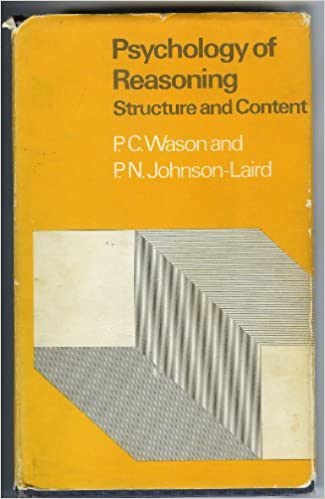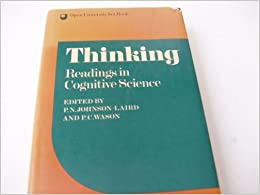Background
Peter Cathcart Wason was born on April 22, 1924, in Bath, England, United Kingdom. He was the son of Eugene Monier and Kathleen Wason. He was the grandson of Eugene Wason.

Oxford OX1 2JD, United Kingdom
In 1948 Peter Cathcart Wason graduated from Oxford University with a Bachelor of Arts degree in English. In 1953 he obtained a Master of Arts degree in psychology from this university.
Gower St, Bloomsbury, London WC1E 6BT, United Kingdom
In 1956 Peter Cathcart Wason gained a Doctor of Philosophy degree from University College London.
Stowe, Buckingham MK18 5EH, United Kingdom
Peter Cathcart Wason was educated at Stowe School.







(At the core of the Psychology of Reasoning is a vigorous ...)
At the core of the Psychology of Reasoning is a vigorous discussion that incorporates various illustrations - some of them humorous, all of them fascinating - of the use of reason under a wide variety of different conditions. Particular emphasis is placed on the difficulties involved in dealing with negatively marked information that must be combined and used with other information for reaching conclusions. Thorough treatment is given as well to the search for plausible contexts that will render anomalous or ambiguous statements "sensible." The authors have strived to isolate the components of inference, the basic steps of any kind of deductive activity, in order to determine the psychological processes involved in them. What has been the outcome of this research? Dr. Wason and Dr. Johnson-Laird conclude, "our research has suggested that the individual's logical competence may be either enhanced or limited by performance variables. And, of these, the content has turned out to be vitally important for revealing, or obscuring structure. At best, we can all think like logicians; at worst, logicians all think like us."
https://www.amazon.com/Psychology-Reasoning-Structure-P-Wason/dp/0674721268/ref=sr_1_fkmr0_2?dchild=1&keywords=Psychology+of+Reasoning%3A+Structure+and+Content+P.+C.+Wason&qid=1607518262&s=books&sr=1-2-fkmr0
1972

(First published in 1977, this is a volume about the scien...)
First published in 1977, this is a volume about the scientific study of thinking: its possibility, its part state, and its future prospects. The editors have brought together a set of readings which draw on work in cognitive psychology, artificial intelligence, psycholinguistics, and philosophy. It is not, however, a mechanical or merely routine collection. At the time of publication, there had been rapid and important advances in several different disciplines concerned with human thinking; many of these advances seem to be fundamental and convergent, to point towards a genuine cognitive science. The editors have tried to capture this sense of readiness, excitement, and impetus in their selection of readings and their presentation of them. There are substantial introductions to each of the seven parts of the book as a whole to connect and explain the material, with the student and general reader particularly in mind.
https://www.amazon.com/Thinking-Readings-Cognitive-P-Johnson-Laird/dp/0521217563/ref=sr_1_1?dchild=1&keywords=Thinking%3A+Readings+in+Cognitive+Science+P.+C.+Wason&qid=1607518559&s=books&sr=1-1
1977

(Examines the psychological motivation of chess players an...)
Examines the psychological motivation of chess players and discusses the role of subjective and irrational considerations in influencing a chess player's decisions.
https://www.amazon.com/Psychology-Chess-W-R-Hartston/dp/0871962268/ref=sr_1_1?dchild=1&keywords=The+Psychology+of+Chess+P.+C.+Wason&qid=1607518769&s=books&sr=1-1
1983
Peter Cathcart Wason was born on April 22, 1924, in Bath, England, United Kingdom. He was the son of Eugene Monier and Kathleen Wason. He was the grandson of Eugene Wason.
Peter Cathcart Wason was educated at Stowe School. In 1948 he graduated from Oxford University with a Bachelor of Arts degree in English. In 1953 he obtained a Master of Arts degree in psychology from this university. In 1956 Wason gained a Doctor of Philosophy from University College London.
After serving as a liaison officer for England’s Eighth Independent Armoured Brigade, Peter Cathcart Wason was wounded in Normandy in 1945. He taught English literature at the University of Aberdeen for a year before deciding to study psychology. During most of the 1950s and 1960s, he was a member of the scientific staff at the Medical Research Council in London. In 1968 he joined the faculty at University College, where he remained until his retirement in 1982.
Greatly influenced by philosopher Karl Popper and psychologist Jean Piaget, Wason built on their ideas to show in experiments he developed - most famously, a card-selection experiment that became known as the Wason selection task - that, rather than trying to disprove ideas they have come to believe in, people generally seek to confirm their beliefs when making decisions. This sort of bias, often determined in the real world by people’s philosophical and religious beliefs - can result in logical errors in reasoning.
Wason wrote of his theories in Psychology of Reasoning: Structure and Content (1972), written with P. N. Johnson-Laird, with whom he also edited Thinking and Reasoning (1968). An expert chess player, Wason was also the co-author of The Psychology of Chess (1983).
Peter Wason was one of the most creative and influential British psychologists of the post-war era. He combined imagination with a strong sense of logic, enabling him to investigate errors of thinking. By designing clever test examples he was able to infer much about how our thinking works, and how it goes wrong, from the mistakes that people make. His best-known book is Psychology of Reasoning: Structure and Content, which he wrote with Philip Johnson-Laird.
(At the core of the Psychology of Reasoning is a vigorous ...)
1972(Examines the psychological motivation of chess players an...)
1983(First published in 1977, this is a volume about the scien...)
1977Peter Cathcart Wason's work was influenced by two academic giants of his period, the philosopher Karl Popper and the Swiss psychologist Jean Piaget. He challenged the orthodox view of his time that people were by nature basically rational and logical, demonstrating, by the ingenious construction of novel experimental tasks, a range of what are now known as "cognitive biases." In so doing, he laid the foundations for the modern study of thinking and reasoning, which has become a major international research field. In contrast with most fields of cognitive psychology, the study of this topic is not dominated by American researchers. It is part of Wason's legacy that, to this day, British and European researchers take the lead in the study of human reasoning.
In 1951 Peter Cathcart Wason married Marjorie Vera Salberg. They had two children, Armorer and Sarah. In 1984 his wife died. In 1986 he married Joan Williams. In 1995 they divorced.
